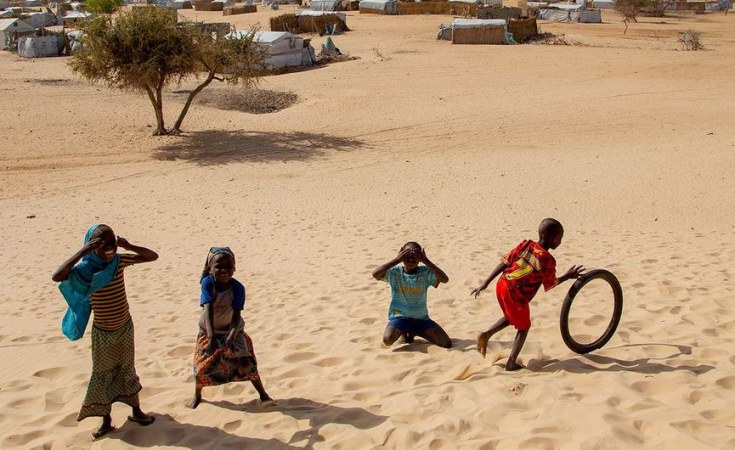Warrant for Opposition Leader; Dozens of Members Arrested
(Nairobi, October 13, 2023) – Arrests of supporters of Chad’s main opposition party seem to be an attempt to limit political dissent before an upcoming constitutional referendum, Human Rights Watch said today. The arrests came days after a June 2023 arrest warrant for the leader of the Les Transformateurs party (The Transformers, in English) appeared on social media. At least 72 party members and supporters have been detained since October 8.
Succès Masra, the president of Les Transformateurs, who left the country after political protests were violently suppressed in 2022, informed the public security minister on October 5, 2023, in a letter that he planned to return to the country on October 18. Later on October 5, the June arrest warrant issued by Chadian authorities appeared on social media. The warrant says he is sought for a variety of crimes including, “attempted attack on constitutional order, incitement to hatred and an insurrectional uprising.”
“Chad’s transitional government should respect basic principles of political plurality as it prepares the ground for a new constitution,” said Lewis Mudge, Central Africa director at Human Rights Watch. “Threatening an opposition leader with arrest and detaining his supporters make clear that fundamental freedoms are still very much at risk.”
The detention of Les Transformateurs supporters comes weeks before the anniversary of the October 20, 2022 protests, when thousands took to the streets in N’Djamena, the country’s capital, and other towns in the south to protest on the date the military administration had initially promised to hand over power to a civilian government. Before the 2022 mass mobilization, the transitional government had on several occasions violently suppressed protests demanding civilian democratic rule.
In a report released in February 2023, the National Human Rights Commission (Commission nationale des droits de l'homme, CNDH) reported that 128 people were killed and 518 injured on October 20, 2022. The commission found that security forces “systematically violated several fundamental human rights … [using] disproportionated means” to quell the protests. The commission put several questions to the government, including why no judicial investigations had been opened for human rights violations and made recommendations to the transitional military authorities, including prosecuting those responsible for serious abuse.
A party member who was detained but subsequently released on October 8, 2023, said that police surrounded roughly 100 party supporters who were exercising around 6:15 a.m. in N’Djamena’s Gassi neighborhood. “We were just [exercising] when they surrounded us and arrested us,” he told Human Rights Watch.
At least 78 people were driven to the headquarters of the National Intelligence Service (Agence nationale de sécurité, ANS) where 72 people remain. Six were released on October 8 without charges. Lawyers for the accused said that the detained party members have not been charged with a crime nor had access to family members or legal counsel. Some family members were allowed to send bread via the guards to their loved ones on October 9.
Chadian law requires renewal of any pretrial detention over 48 hours by a judicial official. It is unclear if this pretrial detention has been renewed. Basic due process standards should be followed, including moving detainees to a gazetted detention center and presenting them before a prosecutor to confirm charges or releasing them and allowing them access to lawyers and family members, Human Rights Watch said.
The party member who was released said that the authorities’ questions were solely focused on whether they were a member of Les Transformateurs and whether groups of party members were taking action to prepare for Masra’s drive from the airport to his party’s headquarters in the Abena neighborhood.
After the mass protests on October 20, 2022, Chadian military authorities suspended Les Transformateurs, other political parties, and civil society organizations united under a coalition known as Wakit Tama, “the time has come” in Chadian Arabic. These suspensions were lifted after three months. Masra left Chad days later. His arrival on October 18, 2023, will be the first time he has been back.
Mahamat Idriss Déby Itno has been the head of the Transitional Military Council (Conseil militaire de transition, CMT) following the sudden death of his father, Idriss Déby Itno, in 2021. A new constitution project proposed by the transitional government was adopted in June 2023 by 96 percent of the members of the National Transitional Council (Conseil national de transition, CNT), which replaced the national assembly when it was dissolved after Idriss Déby Itno’s death. The new constitution will be voted on in a December referendum. Presidential elections are scheduled for 2024.
The recent arrests follow a predictable pattern in Chad over the last few years. Security forces began a crackdown on protesters and the political opposition in the lead-up to the country’s April 11, 2021 presidential election in which former President Idriss Déby Itno ran for a sixth term, arresting at least 112 opposition party members and supporters and civil society activists, severely beating and ill-treating some. After the death of Idriss Déby Itno – and the unconstitutional transfer of power to the CMT – security forces used disproportionate force against opponents, killing some protesters, wounding dozens, and arresting more than 700 people, most of whom were eventually released.
“What Chad’s transitional government does now matters,” Mudge said. “For this referendum to have any legitimacy, opposition parties and their leaders must feel free to meet and campaign. Otherwise, the referendum risks being seen as a means to make the transitional government into a permanent one.”


